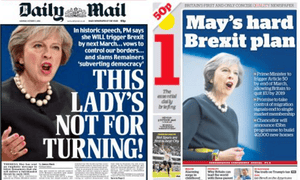
Brexit-supporting newspapers greeted Theresa May’s Brexit speech at the Conservative party conference as if it marked the dawn of a new epoch.
It was “a huge moment in the nation’s history”, said the Daily Mail, while the Daily Express believed us to be “on brink of a new era in British history.” A little less hysterically, the Daily Telegraph regarded it as “a watershed moment.”
The Sun, now firmly of the opinion that May is Margaret Thatcher reborn, said: “We have entered the era of ‘Global Britain’”.
Those newspapers that advocated a remain vote in the EU referendum - Times, Guardian, Financial Times, Independent and Daily Mirror - were unwilling to grant the speech any such accolades.
This national press split represents the continuing division over European Union membership across the UK and, as several papers noted, it also reflects the division within the Tory party.
That was also evident in the leading articles of the Brexiteering quartet. Despite their enthusiam for a new political heroine, they were just as concerned about how she will realise her (and their) ambitions.
The Telegraph, while moved by May’s “stirring and patriotic speech” wondered how she will rise to “the political challenge that lies ahead.” It said:
“Mrs May said she wanted the ‘right deal’ for Britain. But there are fundamental differences of opinion over what that constitutes, not just in parliament but in her own party...
The deep divisions exposed by the referendum are reflected among Conservatives just as they are in the country at large.
Mrs May’s task is to chart a course between the two extremes and find a way through that both holds her party together and benefits the country, while retaining a good relationship with Europe. It is a monumental task that has only just begun.”
The Times thought May “short on specifics”, demonstrating “the risk at the heart of negotiations for Brexit”. It urged the prime minister to “acknowledge that many of the regulations that currently apply as a result of membership are helpful for commerce” and EU membership “confers economic benefits.”
It was unimpressed with her “so-called Great Repeal Act”, arguing that “it is simply not correct for Mrs May to have claimed that this legislation will make Britain a ‘sovereign and independent country’ again.”
The paper also said: “The idea that there are no costs at all in Brexit and that the benefits of membership may be retained is... false and irresponsible.”
The Guardian was, if anything, slightly softer on the prime minister. It noted that May has still failed to detail what Brexit means, but argued that “she did enough to be going on with.”
While accepting that “this is still a largely symbolic stage of the process”, the paper thought it “a very dispiriting spectacle to anyone who wants the terms of Britain’s departure from the EU to contain some recognition that 48% of the electorate rejected the proposition altogether.”
The Independent believed May’s speech indicated “she may be preparing for a hard Brexit” and, if so, “jitters will run through the Europhile wing of the Conservative party quicker than you can say Liam Fox.”
It said: “It is incumbent on the prime minister therefore to provide a clearer sense of what Brexit will look like... Only then can the British people work out whether the government is exceeding the mandate it was given.”
The Financial Times was encouraged by May having “provided much-needed clarity.” Even so, her “speech still leaves plenty of options open” which “may not please business, which has been desperate for [Brexit] details”.
But the FT is clearly worried: “Significant questions... remain about the economic impact... Her speech was predictably heavy on patriotic emotion and light on strategy.”
The Mail wasn’t so concerned about that, praising May for giving “Britain a date with destiny” and “laying out an inspiring vision of Britain’s future after we become an independent sovereign country once more.”
It said: “There is to be no backsliding, no quibbling and no shabby ‘Brexit-lite’ sellout.” But it also realise that May “should be under no illusion about the vast scale of the task ahead”, not least from “many embittered Remainers who still want to subvert the will of the people.” The Mail continued:
“These contemptible wreckers are in total denial about the referendum result. They claim to be standing up for democracy but in fact they are flouting it.”
The Sun referred to remainers as “remoaners” and, while conceding that We should “the road ahead will be tough” believed “the PM has shown us she’s ready to fight and she believes she can win.” It concluded:
“She won’t compromise on restoring British sovereignty, cutting immigration or our ability to forge new trade deals — exactly as the Sun demanded.
A confident, capable female Prime Minister we can be proud of on the world stage. Remind you of anyone?”
The Express pointed to the CBI’s claim that ‘British business can expect a Brexit ‘surge’” and said “the outlook for this country is better than it has been for years.”
And the Mirror? It lashed into May as “an accidental prime minister unable to control her own destiny” who is being “bullied by ideological Tories.”
“Mrs May,” it said, “risks becoming a prisoner of the Tory ideologues”, which represents “a frightening threat to our prosperity and security.”